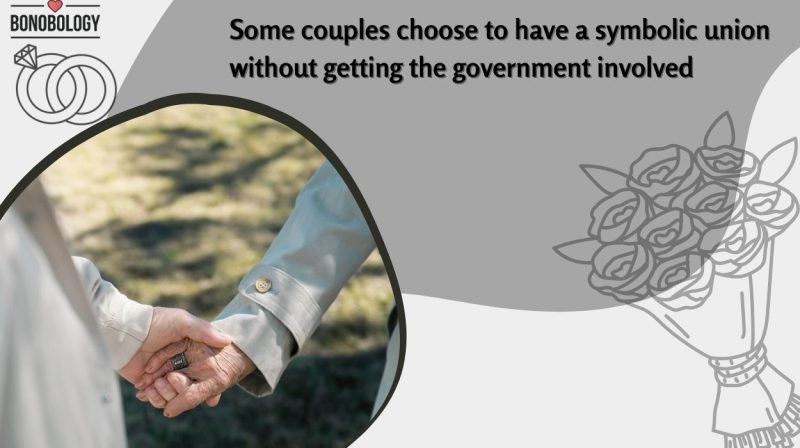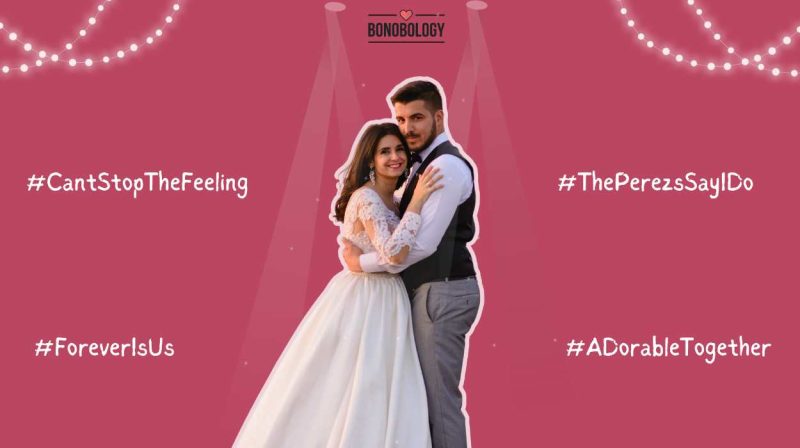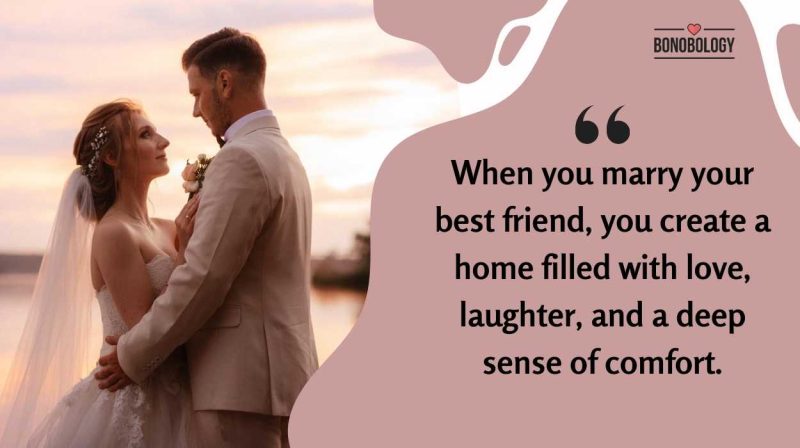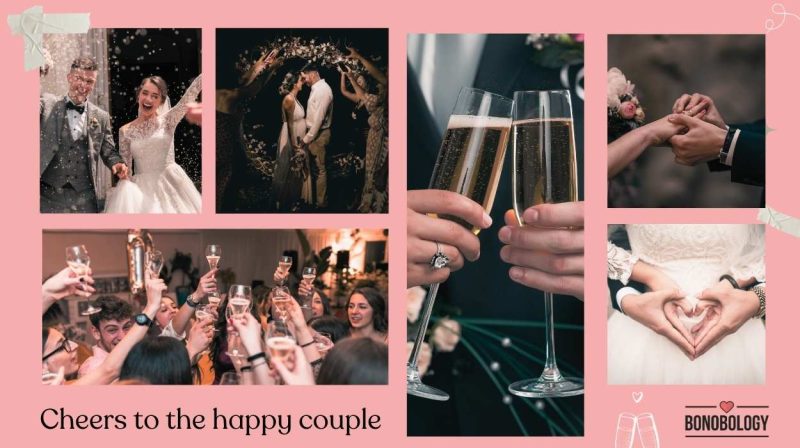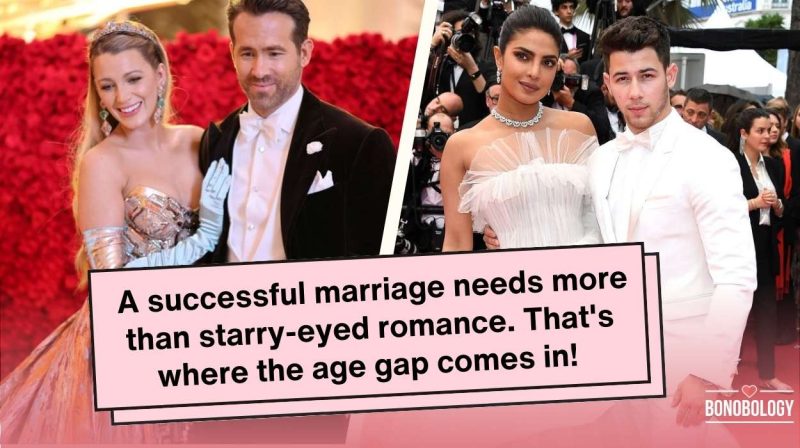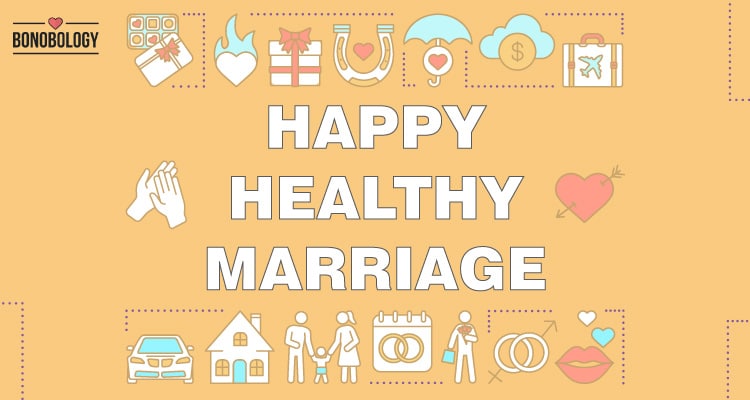The purpose of marriage sounds like a heavy-duty affair (no, not that kind of affair). As relationships and the definitions of commitment change and expand, the objective purpose of marriage, if indeed there is one, tends to get lost in a sea of modern relationship terms.
However, it can’t be denied that marriage has its place in the world. Whether it’s for emotional, financial, or familial reasons; or whether you’re looking at the spiritual purpose of marriage, there’s got to be a reason (or several reasons) why thousands of people of all faiths, nationalities, and genders continue to bind themselves to each other in matrimonial unions.
Sure, it’s not for everyone, and people often have solid arguments against the institution. But, nevertheless, marriage persists like a timeless piece of art, or an annoying mosquito, depending on how you look at it. So, what is the meaning and purpose of marriage? Is there a main purpose of marriage, or is it just an archaic institution that doesn’t really mean much anymore? To gain more insight, we consulted clinical psychologist Adya Poojari (Masters in Clinical Psychology), registered with the Rehabilitation Council of India, for her professional take on the main purpose of marriage.
History Of Marriage
Table of Contents
Before we look at the purpose of marriage today, let’s take a trip down the annals of history to understand how this institution came into being and when. Today, a marriage relationship is synonymous with the ultimate affirmation of the love and commitment two people have for one another. It’s the promise of loving and cherishing one woman or one man for the rest of your life because you can’t imagine sharing it with anyone else. But it wasn’t always this way.
In fact, when it first came into being, marriage wasn’t even a way for a male and female to come together as a family unit. The historical purpose of marriage and the structure of family stemming from it were vastly different from what we understand them to be today. Here is how:
Marriage came into being some 4,350 years ago
To truly understand the historical purpose of marriage, one has to look at and marvel at the fact that this institution has stood the test of time for over four millennia – 4,350 years to be precise. The first recorded evidence of one man and one woman coming together is a marriage relationship dates back to 2350 BC. Before that, families were loosely organized units with male leaders, many women shared between them, and children.
After 2350 BC, the concept of marriage was accepted by the Hebrews, Romans, and Greeks. At that time, marriage was neither a testament of love nor considered God’s plan to unite a male and female for life. Instead, it was a means to ensure that a man’s children were biologically his. The married relationship also established a man’s ownership over a woman. While he was free to satisfy his sexual urges with others – prostitutes, concubines, and even male lovers, the wife was supposed to tend to domestic responsibilities. Men were also free to “return” their wives, if they failed to produce children, and take another.
So, is marriage biblical? If we look at the historical purpose of marriage, it certainly wasn’t. However, the meaning and purpose of marriage have evolved over time – and the involvement of religion played a significant role in that (more on that later).
Related Reading: Why Is Marriage Important? Expert Lists 13 Reasons
The idea of romantic love and being married for life
Given the thousands of years old history of marriage, the concept of romantic love and being married for life is fairly new. For a better part of human history, marriage relationships were built on practical reasons. The idea of romantic love as the driving force being marriage only took hold in the Middle Ages. Somewhere around the 12th century, literature began giving shape to the idea that a man needs to woo a woman by praising her beauty and win over her affection.
In her book, A History of the Wife, historian and author Marilyn Yalom examines how the concept of romantic love changed the very nature of married relationships. Wives’ existence was no longer limited to serving men. Men, too, were now putting effort into the relationship, seeking to serve the women they loved. However, the notion of a woman being her husband’s property continued to prevail until the early 20th century. It was only when women the world over began securing the right to vote, that the dynamics between married couples. As women gained more rights through that era, marriage truly evolved into a partnership of equals.
The role of religion in marriage
Around the same time that the notion of romantic love started to become central to a marriage relationship, religion became an integral part of the institution. The blessings of a priest became a necessary part of the wedding ceremony, and in 1563, the sacramental nature of marriage was adopted into canon law. This meant,
- It was considered an eternal union – the idea of marriage for life came into form
- It was considered permanent – once the knot is tied, it cannot be untied
- It was considered a holy union – incomplete without religious ceremonies
The idea that God created marriage between man and woman also contributed a great deal to improve the stature of wives in marriages. Men were forbidden from divorcing their wives and taught to treat them with greater respect. The doctrine of “the twain shall be one flesh” propagated the idea of exclusive sexual intimacy between a husband and wife. That’s when the idea of fidelity in marriage took hold.
What Is The Biblical Purpose of Marriage?

Even though the concept of marriage predates the concept of organized religion as we know and understand it today (remember, the first recorded evidence of marriage dates to 2350 BC – Before Christ), somewhere along the way the two institutions have become closely intertwined. Not just in Christianity, but in almost every religion across the world, marriages are considered to be “made in heaven”, “designed by the almighty”, and solemnized with a religious ceremony.
While the answer to “is marriage biblical” depends largely on a person’s faith and religious ideologies, there is no denying that the connection between marriage and religion has only been fortified over time. For anyone who seeks to be guided by God’s love, the biblical purpose of marriage can be summed up as:
Related Reading: What Marriage Means To A Woman? Let’s Find Out
1. Companionship
“It is not good for the man to be alone. I will make a helpmate suitable for him” – (Gen 2:18). The Bible says that God designed marriage so that a married couple could work as a powerful team to raise a family and carry out God’s will on earth.
2. For Redemption
“Therefore a man leaves his father and his mother and cleaves to his wife, and they become one flesh” – (Gen 2:24). This verse of the New Testament says that the purpose of marriage was to redeem men and women from their sins. They leave and cleave to build a family unit and protect it from outside influences. According to Jesus Christ’s message, a healthy marriage is a work in progress, aimed at strengthening the relationship a couple shares.
3. A reflection of God’s relationship to the church
“For the husband is the head of the wife as Christ is the head of the church, his body, of which he is the savior. Now as the church submits to Christ, so also wives should submit to their husbands in everything. Husbands love your wives, just as Christ loved the church and gave himself up for her” – (Ephesians 5:23-25).
The purpose of marriage in the Bible is also to reflect God’s love for his church by showing the same love to one’s life partner.
Related Reading: 7 Fundamentals Of Commitment In A Marriage
4. For sexual intimacy and procreation
“Rejoice in the wife of your youth…may her breasts satisfy you always” – (Proverbs 5: 18-19).
A healthy marriage entails different forms of intimacy between a couple. Spouses must not only connect with each other on intellectual, spiritual, and emotional levels but also sexually. Sexual intimacy is an integral purpose of marriage.
The biblical purpose of marriage also includes utilizing sexual relationships for procreation. “Be fruitful and increase in number” –(Genesis 1:28). However, this is not to say that marriages without children are somehow lacking in serving the purpose they were intended to. Many experts of the scriptures believe that procreation as the purpose of marriage in the Bible didn’t just mean having children. A couple can also be procreative in other areas of life and contribute to God’s plan by working toward building stronger communities.
5. For protection against sin
“But if they cannot control themselves, they should marry, for it is better to marry than burn with passion” – (1 Corinthians 7:9).
Since the religious scriptures deem sex outside wedlock an act of sexual immorality, prevention of sin can also be considered one of the purposes of marriage. However, it is not a primary purpose of marriage in the Bible by a long shot. It is more of a reiteration of the fact that sexual passions must be shared by a husband and wife inside of a marriage, not outside it.
Related Reading: Marriage Counseling: 15 Goals That Should Be Addressed, Says Therapist
What Is The Purposes Of Marriage Today?
Now that we have touched upon the evolution of marriage, how its purpose evolved over the centuries, and how religion defines the place of marital relationships in society, let’s take a look at what purpose this institution serves in the modern times. According to Adya, while everyone has their own ideas about the meaning and purpose of marriage, there are some broadly common factors that influence most people’s decisions to get married. Mind you, it’s difficult to generalize in this day and age, but we’ve rounded up some deep-seated reasons and purposes that mean marriage still stands in good stead.
1. Marriage brings a semblance of emotional security
I’m a romance novel nerd, and growing up, it seemed as though all my favorite stories ended the same way – a woman in a long, white gown, walking down a church aisle toward her soulmate. It was always a man, tall and handsome, who would take care of her forever. Marriage brought certainty, a relieved realization that you didn’t need to worry anymore.
The world has changed and marriage is no longer the only way to proclaim and lock down your love. And yet, it’s hard to find an alternate institution or set of rituals that lend this much certainty. Divorce rates may be high, domestic partnerships are far more frequent, but when it comes down to it, you’re rarely as certain as you are when you’ve got a ring on your finger and whisper, ‘I do.’
“We’re conditioned to believe that marriage is the ‘aha’ moment of a romantic relationship,” says Adya. “When someone asks you to marry them, your brain automatically lights up with ‘Yes, they’re serious about me!’” Pop culture, social circles etc. all tell us that successful marriage is like being wrapped in a cozy blanket of security and certainty. Whether it’s true or not, there’s no doubt that many of us believe in it fervently, making it a major purpose of marriage.
2. If you were raised religious, marriage is the ultimate union
“My family is deeply religious,” says Nichole. “I dated a bunch of people all through high school but I was always taught that marriage was the aim because God willed it so. Living together without marriage wasn’t an option. And I didn’t want to, either. I liked that there was such a deep, sacred and spiritual purpose of marriage, that somewhere, in the eyes of God and my family, I’d done the right thing.”
The biblical purpose of marriage includes rearing children, along with companionship and support between a husband and wife. Other spiritual purposes of marriage, whatever religion or spiritual path you’ve chosen to follow, too, counsel that marriage is the ultimate act of love, that it teaches us to care for someone deeply, other than ourselves.
“Historically, and even now, the main purpose of marriage is that two people are in love and will be able to support each other. In its deepest sense, marriage is a sign that they are ready to share their intimate lives,” Adya says. There’s something to be said about entering a sacred, mystical union where love isn’t just about you and your spouse, but where you receive the approval and blessings of those you love best. You always thought love was divine, and marriage just confirmed it.
Related Reading: 4 Types Of Soulmates And Deep Soul Connection Signs
3. Marriage offers certain protections
Lest we forget, marriage is deeply rooted in the protection of women. Long before legal and religious ceremonies became part of it, marriage was all about ensuring a woman was safe and taken care of. Through the years, protection has taken on many forms – warding off loneliness and financial conflict, the right to property, custody of children in case of a divorce and more.
“Honestly, when I think about why I got married, the words ‘better health insurance’ come to mind,” laughs Kristy. “Don’t get me wrong, I adore my husband, but there were other considerations, too. As a single woman living alone, I was automatically vulnerable to so many things. What if there was an intruder? What if I slipped and fell in the house, and couldn’t call anybody? Plus, as much as marrying for money sounds terribly mercenary, I’m so relieved to have a two-income household.”
Since we’re talking about facts, here are some cold, hard ones. One pragmatic purpose of marriage is to alleviate loneliness and singledom, but it doesn’t hurt when it also alleviates a single bank balance and adds to it.
Maybe money isn’t the main purpose of marriage, though it can be, but financial security is a huge factor. Add to this that since marriage is a legal tie, you can have a prenuptial agreement and ensure that you and any kids you have are taken care of even if the marriage doesn’t work. Ultimately, the practical aspect of the institution could become the meaning and purpose of marriage.
4. In marriage, family matters
“I grew up in a large family home, and I couldn’t imagine anything different for myself,” says Ramon. “I had two main reasons for getting married – I wanted to stand up and proclaim my commitment to my partner in front of my family; and I wanted to raise my own large family. I didn’t want to do it with a cohabitation partner, I wanted to do it with a wife. It was that simple.”
“One of the main purposes of marriage is to have children, to pass on the family name, to have a rich inheritance, both material and immaterial, to pass down. Of course, times are changing, people are choosing not to have children, or to adopt rather than bear biological offspring. But in many cases, this remains a major factor in the purpose of marriage,” Adya says.
Family has always been seen as the primary social and emotional unit, and more often than not, marriage is at its center. One main purpose of marriage, therefore, is a sense of continuity. Through marriage, through children, you get to pass on genes, homes, family heirlooms, and hopefully a strong sense of love and belonging. It’s hard to find a more significant purpose.

5. In the eyes of the world, marriage validates your relationship
We’ve come a long way from seeing marriage as the only way to show your commitment and love. There are live-in relationships, open relationships, polyamory and a whole spectrum of feelings and definitions to express your feelings for someone. And yet, marriage remains something of a global phenomenon, something that is recognized and, let’s face it, easier to explain to most people than other forms of commitment.
“I was so incredibly happy when LGBTQ people could finally get married in my state,” says Christina. “I’d been with my partner for four years, we’d lived together for two of them. It was great, it wasn’t as though anything was missing. But, I wanted to call her my wife, and be a wife myself, and have a wedding and a party. I guess, for us, having the choice was important, and to openly proclaim our love was amazing.”
Marriage brings with it legal, religious, and social validation, and even if that’s not really your thing, there’s a certain convenience to it. Marriage brings with it a host of benefits. Apartment-hunting is easier, grocery shopping is nicer and you no longer need to face raised eyebrows when you introduce someone as a ‘partner’. These are things to keep in mind when wondering, “Is marriage worth it?“
Related Reading: 10 Bankable Reasons For Getting Married
6. In its best form, marriage gives you lifelong companionship
In the movie, Shall We Dance, Susan Sarandon’s character says, “In a marriage, you’re promising to care about everything. The good things, the bad things, the terrible things, the mundane things… all of it, all of the time, every day. You’re saying, ‘Your life will not go unnoticed because I will notice it. Your life will not go unwitnessed because I will be your witness.’”
I sort of believe everything Susan Sarandon says, even if it’s only a character she’s playing. But honestly, there’s a tenderness and a truth to these words that even the hardened anti-marriage activist would find difficult to deny. Ultimately, love is about noticing your significant other as much as is humanly possible, no matter how small a detail is. And marriage just brings you a little closer to being able to do that, because, not only are you sharing living space, you vowed to be together forever. And, you know, forever is full of seemingly small moments and details that a husband or a wife would notice because that’s why they’re there.
“Marriage is all about trusting, developing respect in a relationship, making it into something beautiful and meaningful. While it’s not possible to know someone inside out even as a spouse, you do hopefully get to spend enough time together to get to know each other enough,” says Adya.
“Maybe the honeymoon phase is over, and the charm might wear off with time, but what you have left is conversation and companionship. And hopefully, you know each other’s moral and emotional selves and you know you’re happy just spending time with them and being present with each other,” she adds. We’d like to believe that the purpose of any loving relationship is togetherness. To figure our messy selves out and see how much love we’re capable of. And perhaps the main purpose of marriage is that it gives us a socially sanctioned way of doing this.
Key Pointers
- The purpose of marriage has evolved over centuries, starting as a transactional relationship to becoming rooted in love
- Companionship, redemption, sexual intimacy, procreation, and protection against sin are some of the purposes of marriage in the Bible
- In the modern times, marriage has evolved into a partnership of equals that can provide comfort, companionship, a family structure, as well as other benefits
- Even though this institution has stood the test of time, it may not be for everyone. If you choose to not get married or your circumstances don’t allow you do, don’t think that it takes away from your social significance or value as a human being in any way
Marriage is not accessible to everyone. Your sex, your gender, your politics, your religion, all of this could keep you from getting married in certain places. Marriage is in no way all-inclusive, and in many cases, may have nothing to do with feelings. None of this diminishes its power or social significance, though. Marriage is too old, too deeply rooted and has too much fanfare and pageantry around it to be snuffed out by something as seemingly insubstantial as a lack of feeling.
But if done right, if done by choice and with enough kindness and fewer relatives, marriage certainly serves a purpose. Yes, it’s about finances, and about raising a traditional family and belief in a divine being who has the power to make us very unhappy if we do things outside the confines of marriage. But hey, it’s also about champagne and cake and presents and a honeymoon.
But ultimately, the main purpose of marriage, we feel, is just one of many, many ways to stand up in front of a crowd and let your soulmate know that you’ve got their back. That through thick and thin, one bank balance or two, sickness, health and health insurance, you will always have each other. Now, even my crabby, old self will agree that there’s no greater purpose than that.
8 Reasons Why Separate Bedrooms Are Good For Married Couples
7 Tips For A Happy Married Life: Confessions Of A 90-Year-Old
Your contribution does not constitute a charitable donation. It will allow Bonobology to continue bringing you new and up-to-date information in our pursuit of helping anyone in the world to learn how to do anything.





